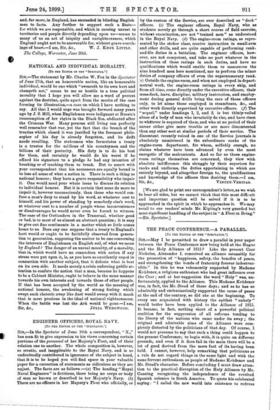ENGINEER OFFICERS, ROYAL NAVY.
[To THE EDITOR OF THE "SPECTATOR."]
SIR,—In the Spectator of June 10th a correspondent, " X.," has seen fit to give expression to his views concerning certain portions of the personnel of her Majesty's Fleet, and of their relation one to another. The whole composition is, however, so erratic, and inapplicable to the Royal Navy, and is so undoubtedly contributed in ignorance of the subject in hand, that it is to be hoped you will find space in your valuable paper for a correction of statements as ridiculous as they are unjust. The facts are as follows :—(a) The heading " Royal Naval Engineers" is fictitious, there being no corps or body of men so known or described in her Majesty's Navy. (b) There are no officers in her Majesty's Fleet who officially, or
by the custom of the Service, are ever described as " deck" officers. (c) The engineer officers, Royal Navy, who as students merely go through a short course of field exercise, without examination, are not "trained men" as understood in the Royal Navy. (d) The engine-room ratings, as repre- sented by the stoker class, receive instruction in small-arm and other drills, and are quite capable of performing rank- and•file duties in a battalion. The engineer officers, how- ever, are not competent, and take no part whatever in the instruction of these ratings in such duties, and have no qualifications which would enable them to mancenvre the nine hundred men here mentioned, nor to perform the minor duties of company officers of even the supernumerary rank. ,'e) Outside the engine-room, and when not employed in depart- mental work, the engine-room ratings in every ship, and from all time, come directly under the executive officers; their mess-deck, leave, discipline, military instruction, and employ- ment during general drills being the care of these officers only, to let alone those employed in steamboats, &o., and other work directly supervised by executive officers. (f) The " sequel," under headings 1, 2, and 3, is but thinly-veiled abuse of a body of men who invariably do rise, and have risen to whatever is required of them, and who at no period of their career either give more trouble or are more discontented than any other sect at similar periods of their service. The discontent recently voiced in one of the Service journals is absolutely unmirrored in the subordinate ranks of the engine-room department, for whom, selfishly enough, no claims whatever have been advanced by even the most energetic of the malcontents. And so far as these engine- room ratings themselves are concerned, they view with absolute indifference this struggle by their superiors for ranks and uniforms, the duties appertaining to which are entirely beyond, and altogether foreign to, the qualifications and knowledge of the officers thus desiring them.—I am,
[We are glad to print our correspondent's letter, as we wish to hear all sides, but we cannot think that this most difficult and important question will be solved if it is to be approached in the spirit in which he approaches it. We may recall to our readers' minds Mr. Kipling's very guarded but most significant handling of the subject in " A Fleet in Being." —ED. Spectator.]


















































 Previous page
Previous page